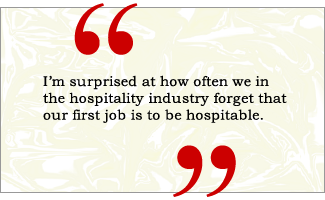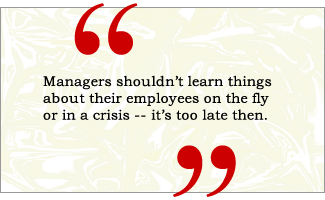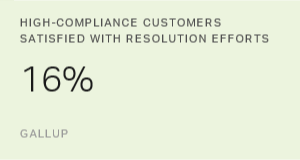To hoteliers, it's no big deal. Guests start trickling in, the trickle becomes a flood, then suddenly the lobby is crowded with people. It's a daily phenomenon in the hospitality business, and hotel managers are grateful for it. Busy is good, because busy means business. And hotel staffs shouldn't find big crowds terribly stressful because good managers train everyone from the front of the house to the dishwashers to deal with a deluge. Busy is just part of the day for hotel managers and employees -- but not for guests.
 |
To guests, busy means anxiety. Look at it from their point of view. Busy means that it will be a long time until an employee notices or cares that they're there, and even longer before they get what they came for: comfort, rest, and security. Too often, when guests enter a packed lobby, they're not offered help, they're beset by noise, there's nowhere to sit, they're toting heavy luggage, and there appears to be only a handful of staff to deal with the chaos. To a hotelier, it's just part of the day. To guests, it's miserable. Most people are willing to be patient in these situations, but that tolerance is short-lived. When it's gone, whatever potential exists for customer engagement is gone with it.
It's gone, that is, unless the manager handles the situation the right way -- by making sure every guest feels welcome, by putting employees who have the talent to calm anxiety in front of customers, and by making good on the brand promise of comfort. In fact, if managers deploy their staff properly, with an eye toward maximizing their employees' innate talents and minimizing their limitations, tense situations can become the first building block in a foundation of customer engagement.
The meaning of hospitality
I'm surprised at how often we in the hospitality industry forget that our first job is to be hospitable and that customers really are our guests. We need to treat them as such, no matter how busy it gets. So, long before the deluge inundates the lobby, managers need to drill staff in the basics:
- First, employees must understand customers'
expectations -- someone needs to care about them from the
moment they step on your hotel property.
- Second, guests need to be occupied with something any
time they're in a public space. Unoccupied time seems longer than
occupied time, so long lines can feel interminable. This is when
guests become impatient, or worse, hostile.
- Third, employees -- all of them -- must understand that no matter what they're doing, no matter what their job description, their first responsibility is to their guests.
Fine words, of course, but the key is putting them into practice. And it's not as difficult as one might think. When the front desk is overwhelmed and guests are starting to crowd the lobby, a manager should call everyone to the front of the house, as long as this doesn't create another queue in the department they came from. If the reservations department isn't swamped, they should come running out. The manager should pull people from banqueting and pull the bartenders from behind the bar. Anyone who can lend a hand should.
Most importantly, every manager should be highly visible. (It's amazing what the mere sight of the word "manager" on a nametag can do; it suggests to guests that the operation really cares and the situation is under control.) Then the manager gets all those people busy, but it must be done the right way. I'll explain that in a moment. First, here are some specific actions that managers and employees could take:
- They could comp drinks at the bar -- and if there is no bar,
free bottles of water are always welcome.
- Someone could offer to assist guests with their luggage, even
if their wait will be brief.
- A staff person could circulate with registration cards -- it
helps keep guests busy and speeds things up later at the reception
desk.
- Managers and employees should try to speak with every guest in the lobby -- welcome them, answer questions, facilitate check-in -- showing the caring face of the organization. You would be surprised at how many problems this can resolve or prevent and how much easier it makes things for the front desk staff.
It isn't necessary to betray the brand promise; a budget hotel shouldn't send out a fleet of bellmen to collect baggage. A luxury property, however, should make sure every waiting guest has a drink, at the very least.
Who, what, and how
But stop for a moment. Before hotel managers can do any of this, they really must know the innate talents of each of their employees. Just throwing any warm body into the torrent in the lobby can make matters worse. Managers shouldn't learn these things about their employees on the fly or in a crisis -- it's too late then. They must make an ongoing effort to understand their people, work with them, and engage them -- all day and every day.
The problem is that most managers aren't taught to look through "the people lens." Most of the time, managers in any industry handle problems in the order "what/how/who": What's the problem? How can we fix it? Who can do that?
 |
Smart managers, on the other hand, use a different order: Their first question is Who do I have? Then they ask, What's the problem? And finally, How do we fix it? Those managers know that it's critical to match people's talents to tasks, particularly in stressful periods.
For instance, if the bartender is the kind of guy who has the talent to turn chaos into a party, he should be handing out drink vouchers. In contrast, if a reservation agent is available to help, but she's not really good at comforting guests, she should not be forced to chat with them. But if she can stay calm in a crisis, she can help at the front desk with the check-in procedure. She'll need training, of course -- assisting the front desk isn't her primary job -- but cross-training is how good managers anticipate and prepare for peak periods.
Looking at things through the people lens is the way to create customer and employee engagement. When the profit margin is razor thin, and it is in just about every hospitality business, engagement is the key to both revenue and differentiation. None of these suggestions -- knowing the staff, keeping your guests occupied, and putting people first -- is all that difficult. But very few managers do it. Most just wait for the problem to go away. The real problem is that busy times antagonize guests. And it's true -- they do go away. Next time, they'll go to your competitor.
The next flood
Whether they're spending $50 or $5,000, or the lobby is packed, or a tenth of the staff calls in sick, or the delivery guy doesn't show, or a pipe bursts, guests should still feel like guests, not problems. If a hotelier does everything right -- prepares for peaks, looks through the people lens, operationalizes by asking who/what/how -- a busy period, even a crisis period, can be an excellent opportunity to create engagement. The place to start is with the relationship between employees and their boss. To guests, that relationship is no big deal. But to the people who actually run a hotel, it's everything.
